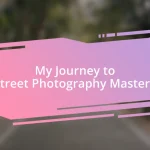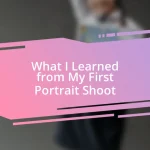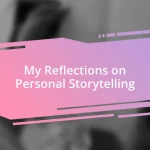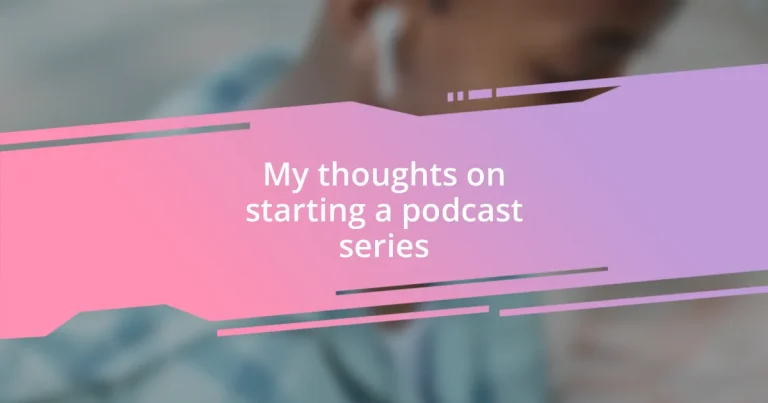Key takeaways:
- The podcasting landscape is growing rapidly, with a diverse audience, particularly among Millennials and Gen Z, who favor intimate, conversational content.
- Identifying your podcast niche requires a balance of personal passion, audience demand, and a unique perspective to fill content gaps.
- Engaging with your audience through feedback, community-building, and interactive elements strengthens listener connection and enriches content.
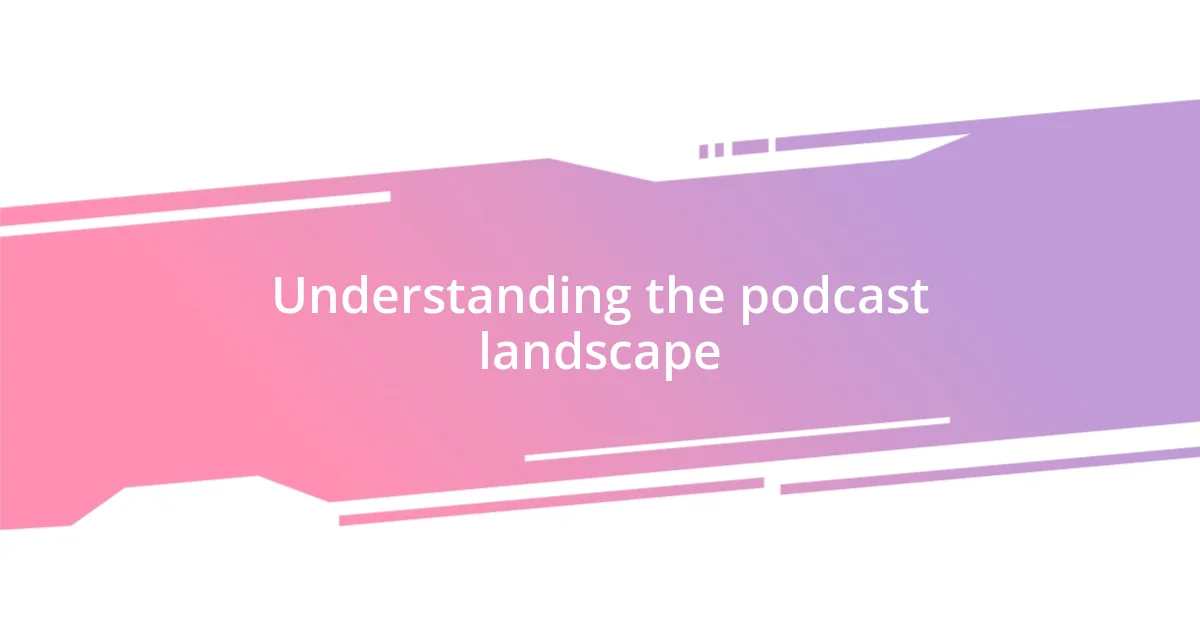
Understanding the podcast landscape
The podcast landscape has exploded in recent years, with an estimated 500,000 active podcasts available today. I remember when I first discovered this medium; I was amazed at the diversity of voices and stories out there. It made me wonder, how many conversations are happening right now that I’ve yet to hear?
What strikes me as particularly fascinating is the shift in how people consume content. Unlike traditional media, podcasts allow listeners to engage with topics in a more personal and intimate way. When I listen to a podcast while cooking or exercising, it feels like I’m part of a deep conversation, doesn’t it? This accessibility is something that I believe makes the podcast medium so appealing.
Moreover, the demographics are shifting too. Millennials and Gen Z are increasingly turning to podcasts as a primary source of information and entertainment. I often find myself chatting with friends about our favorite shows, and it dawns on me how these discussions create a sense of community. Isn’t it exciting to think that by starting your own podcast, you could tap into these conversations and build your own audience?
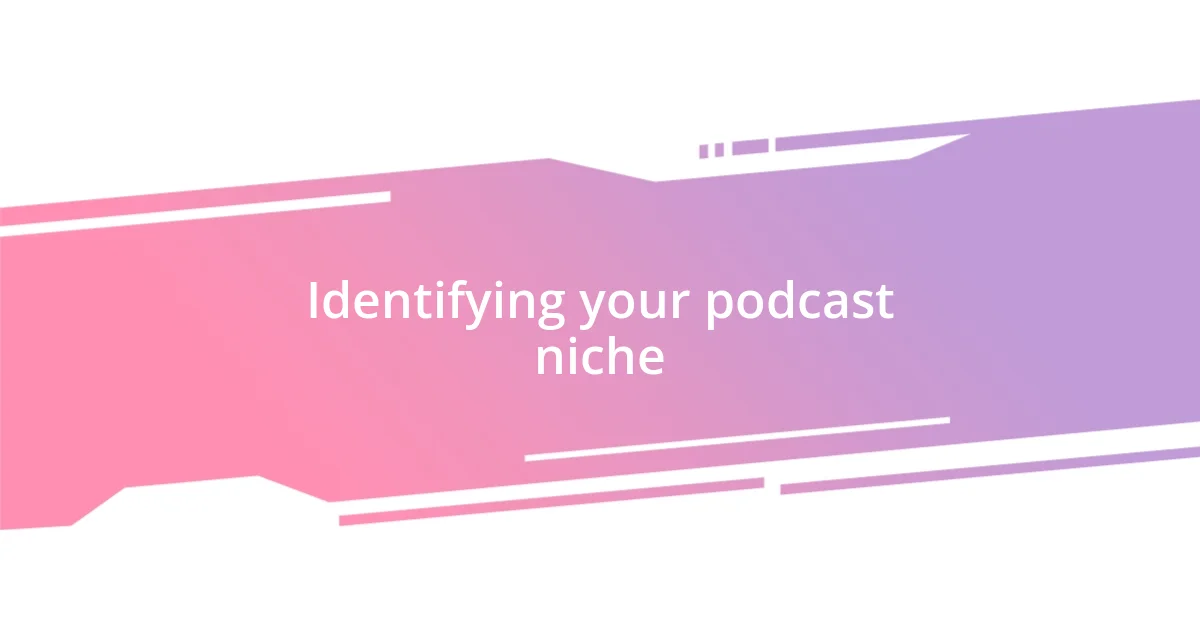
Identifying your podcast niche
Finding your podcast’s niche is like discovering a hidden gem waiting to be polished. I learned early on that your niche should reflect both your passions and what you believe can offer value to others. It’s not always easy; I remember wrestling with my own interests, unsure of where I fit. But once I honed in on that perfect intersection of my expertise and the interests of potential listeners, everything clicked into place.
Here are some essential factors to consider when identifying your podcast niche:
- Personal Passion: Choose a topic that excites you. Your enthusiasm will resonate with listeners.
- Audience Demand: Research what listeners are craving. Tools like Google Trends can help you spot trending topics.
- Unique Perspective: Consider how your experience can provide a fresh viewpoint on a common subject.
- Content Gaps: Identify areas that other podcasts might overlook; filling those gaps can attract a dedicated audience.
- Sustainability: Ensure your topic has enough depth to explore over multiple episodes, keeping the content engaging long-term.
Finding that niche isn’t just about content; it’s about connecting with listeners who share your interests and fueling your creativity along the way.
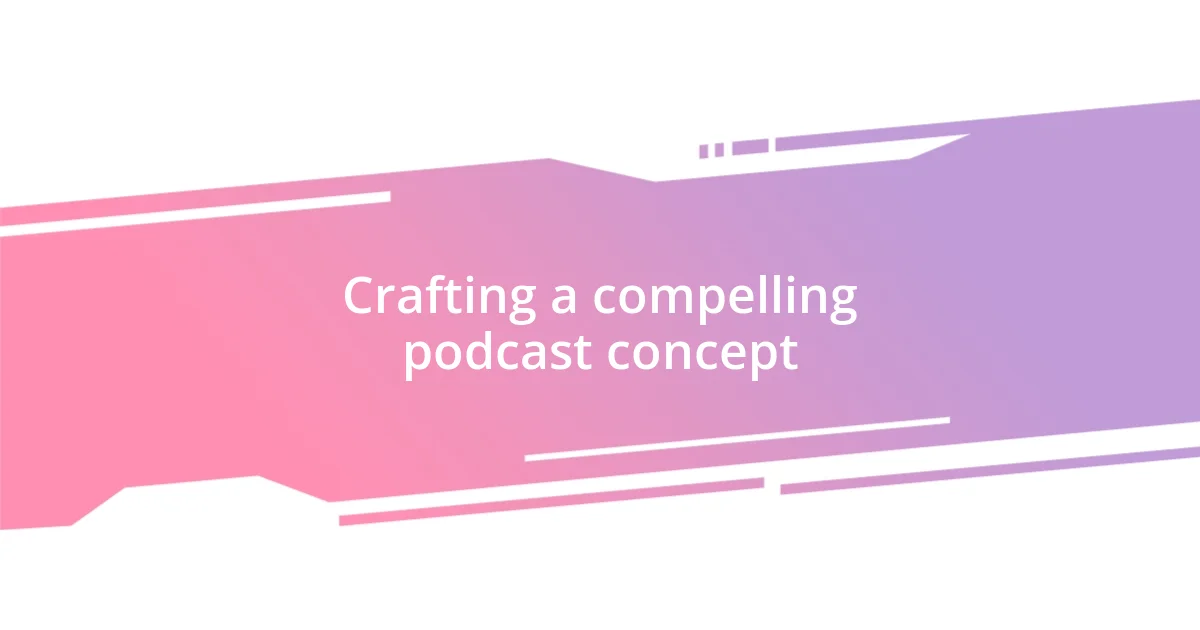
Crafting a compelling podcast concept
When crafting a compelling podcast concept, it’s crucial to think about storytelling. I’ve always believed that every podcast centers around a narrative arc, whether it’s a discussion, interview, or narrative piece. My experience has shown me that weaving a good story captivates listeners; it pulls them in, making them feel invested in what happens next. For instance, I once listened to a series that transformed a seemingly mundane topic—the history of everyday objects—into a thrilling exploration of ingenuity and culture. It left me curious, making me want to explore beyond the episode!
Another element that stands out is the format of your podcast. Should it be solo, co-hosted, or interview-based? Each format has its unique charm. Personally, I find that co-hosting brings a dynamic energy that solo shows sometimes miss. The interplay of ideas and banter creates a more engaging experience for the audience. I recall starting a podcast with a friend where we debated unconventional topics; the chemistry we had was electric and translated beautifully to our listeners. What about you? Can you imagine how discussing ideas with someone else might spark unexpected conversations?
Lastly, don’t underestimate the power of originality. I’ve come across countless podcasts trying to imitate the latest trends instead of carving their own path. When brainstorming your concept, think about what makes you different. Maybe it’s a unique cultural perspective or an unusual thematic twist. For me, it was connecting my love for travel with personal growth stories from my journeys. It opened up a whole new realm of possibilities, and it’s invigorating to think about how your distinct voice can resonate with others in this vast podcasting world.
| Element | Details |
|---|---|
| Storytelling | Engages listeners through a narrative arc, making the podcast more captivating. |
| Format | Choose between solo, co-hosted, or interview styles for dynamic interactions. |
| Originality | Focus on what sets you apart, offering a fresh perspective in a crowded space. |
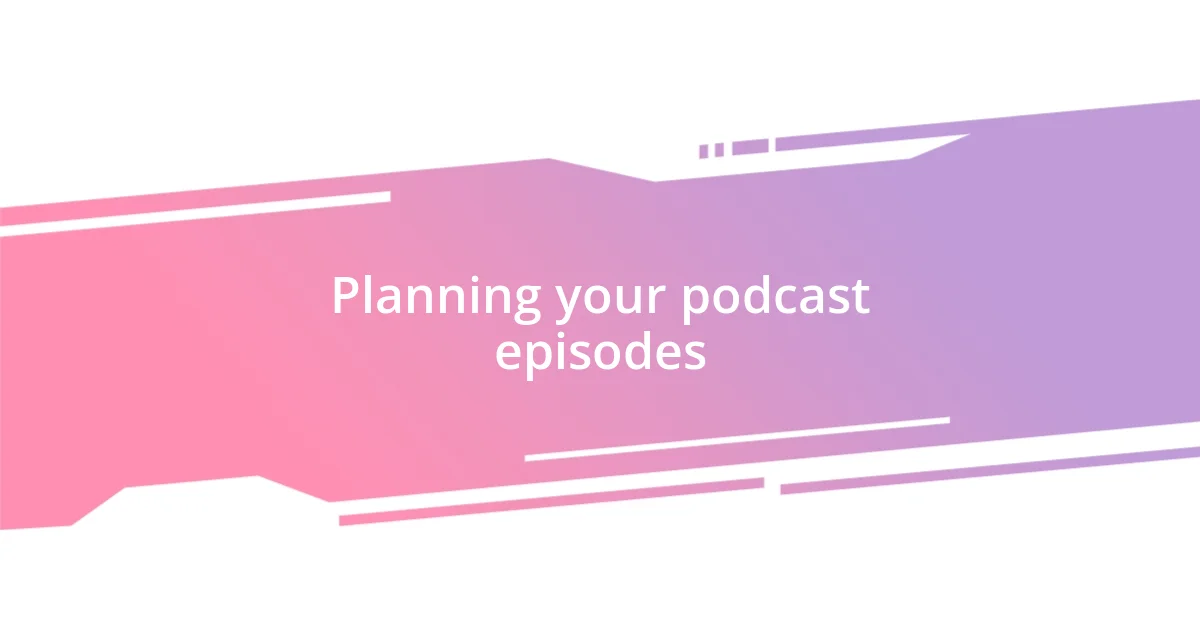
Planning your podcast episodes
When it comes to planning your podcast episodes, I find it essential to outline a clear structure for each one. I recall the first time I jumped into this process; I scribbled down potential bullet points and topics, but it quickly became evident that I needed something more organized. Utilizing a simple spreadsheet to map out episode titles, themes, and key takeaways not only helped me stay focused, but it also allowed me to see how each episode could build on the last. Have you considered how a structured outline might enhance your flow and maintain your listeners’ interest?
Another important aspect of planning is scheduling your episodes. I’ve discovered that consistency is vital for building momentum. Initially, I took a hit-or-miss approach, releasing episodes whenever inspiration struck. However, I found that setting a regular release schedule helped cultivate a dedicated listener base. It’s made me think about how exciting it is for someone to anticipate a new episode every week, much like tuning in to their favorite TV show. Imagine what kind of community you could foster by being reliable with your content!
Finally, I often remind myself to incorporate listener feedback into my planning. I made it a point to engage with my audience on social media, asking them what topics they wanted to hear about. To my surprise, it not only boosted engagement but also led to episode ideas I would have never considered. Listening to your audience’s interests can create a deep connection, making your podcast feel more like a conversation rather than a broadcast. How might your listeners’ insights shape the future of your podcast?
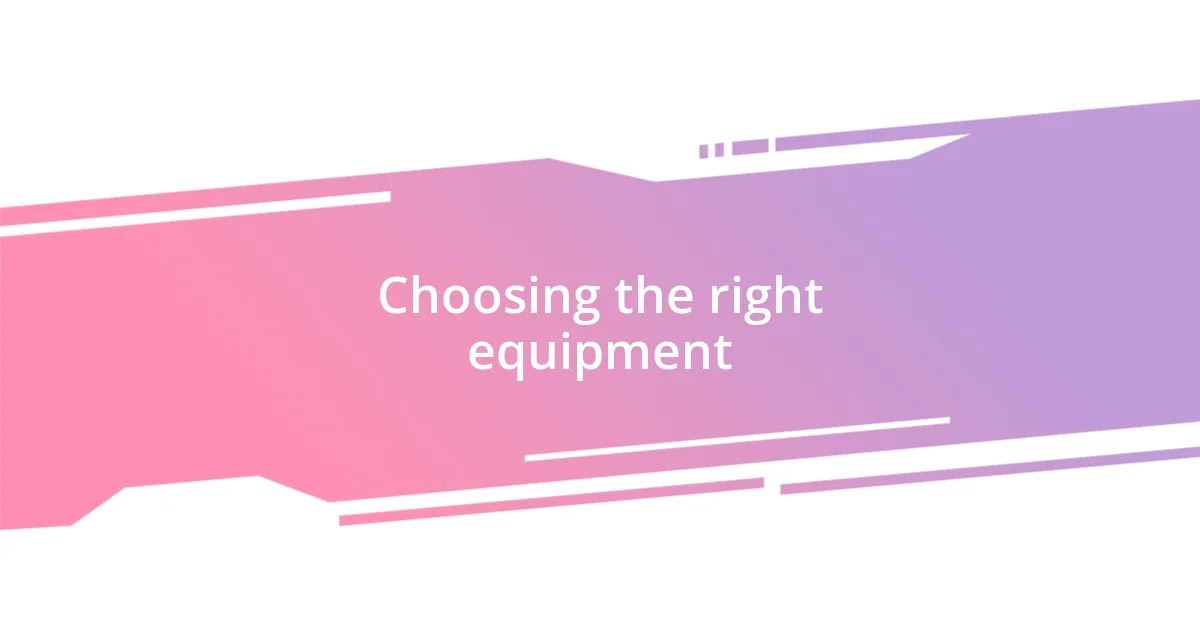
Choosing the right equipment
Choosing the right equipment can feel overwhelming, especially with the myriad options available today. In my early podcasting days, I remember spending way too long researching microphones and mixers—only to realize I was overcomplicating it. I ultimately landed on a USB microphone that offered great sound quality without the hassle of additional gear, and that choice made a world of difference. Have you considered how streamlined equipment can help you focus more on content rather than tech troubles?
Investing in headphones is just as important. I can’t stress enough how essential it is to hear the audio quality while recording. The first time I recorded without a good pair, I missed background noises that ruined the episode. Switching to closed-back studio headphones allowed me to catch those issues in real time, improving the overall listening experience for my audience. Think about how frustrating it would be to release a podcast only to discover poor sound quality that detracts from your message.
Lastly, don’t overlook the software you’ll need for editing. Initially, I tried relying on free versions, thinking they would suffice, but soon found myself frustrated by their limitations. After switching to a user-friendly editing tool, I was amazed at how much smoother the entire process became. The right software can really enhance your workflow and make the post-production phase enjoyable instead of a chore. What editing tools have you considered, and how might they impact the ease of creating your episodes?
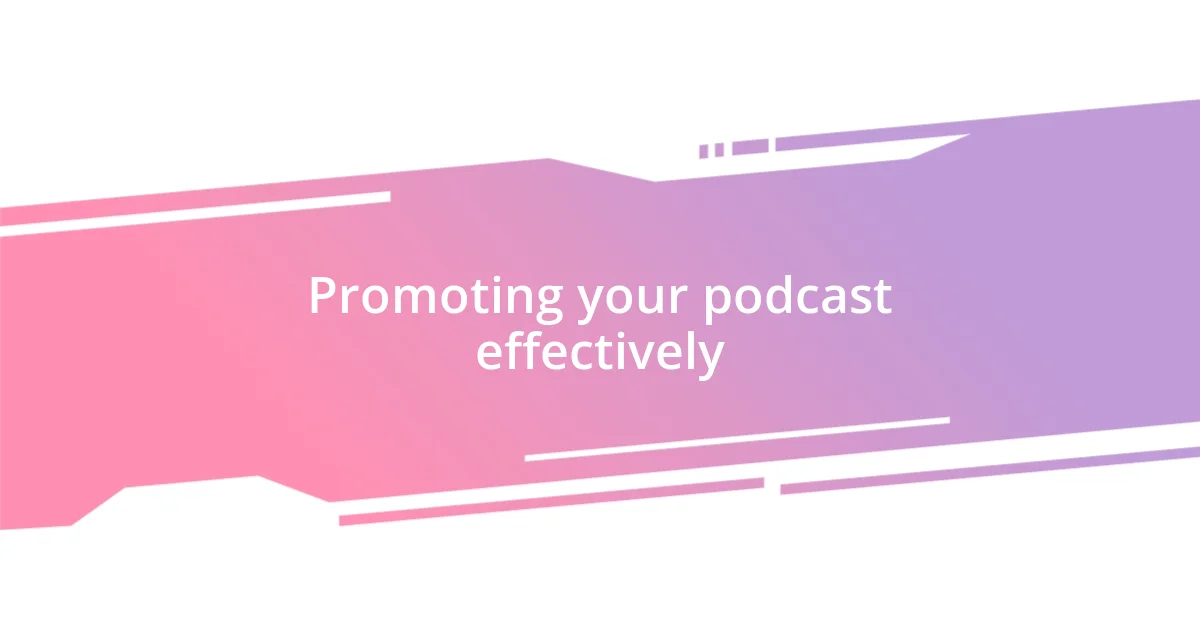
Promoting your podcast effectively
Promoting your podcast effectively requires a multi-faceted approach that can truly amplify your reach. I vividly recall my excitement when I first shared my podcast on social media. It was a bit nerve-wracking, yet exhilarating to see listeners start to engage. Utilizing platforms like Instagram and Twitter became crucial for sharing snippets, behind-the-scenes content, and upcoming episode teasers. Have you thought about how a dynamic social media strategy can create buzz around your podcast?
Another strategy that really made a difference for me was networking with other podcasters. I reached out for guest appearances and cross-promotions, which allowed me to tap into their audiences as well. It felt rewarding when I saw new listeners coming from those collaborations. I started to think about how powerful it can be when voices come together—what communities might you build by joining forces with like-minded podcasters?
Finally, I learned the art of leveraging email newsletters. Initially, I hesitated, assuming my audience preferred social media. However, crafting a monthly newsletter that included episode highlights and personal anecdotes turned out to be a game changer. As I connected more intimately with my listeners through storytelling, I noticed increased engagement and loyalty. Isn’t it fascinating how effective communication can transform casual listeners into a dedicated community?
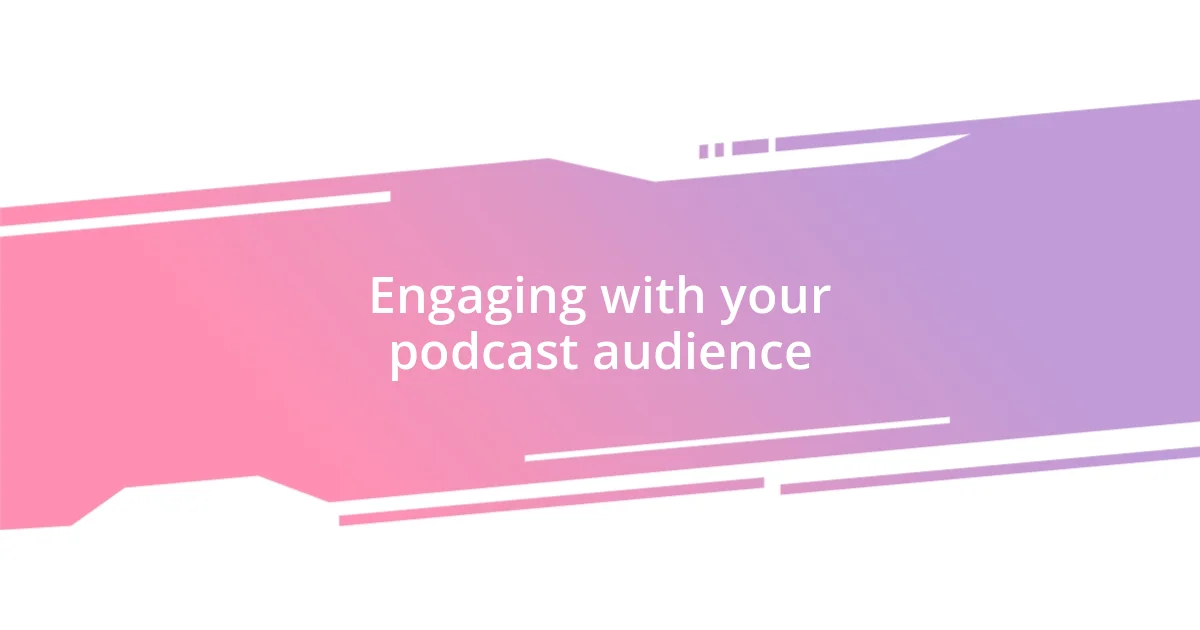
Engaging with your podcast audience
Engaging with your podcast audience is an essential element that can significantly enhance your overall experience as a podcaster. One of the most effective ways I found to connect was through listener feedback. In my early episodes, I would sometimes ask questions at the end of the show, encouraging listeners to share their thoughts. The first time I received an email expressing how much an episode resonated with someone, it truly warmed my heart and motivated me to keep going. Have you thought about how valuable your audience’s opinions can be in shaping your content?
Creating a sense of community around your podcast can be a game changer for audience engagement. I introduced a dedicated segment in my podcast where I read listener comments and questions aloud. This not only made my listeners feel heard but also fostered a collaborative environment where they became part of the conversation. I could feel their excitement through messages and social media interactions. Have you explored ways to invite your audience to contribute ideas or stories that tie into your podcast’s theme?
Finally, utilizing interactive elements, like polls or Q&A sessions, can transform how you engage with your audience. I experimented with Instagram stories to gauge what topics listeners wanted to hear about next. The results were surprising and led to episodes that truly excited my audience, making them feel involved in the creative process. Isn’t it amazing how inviting your listeners into your journey can lead to richer, more relatable content?


